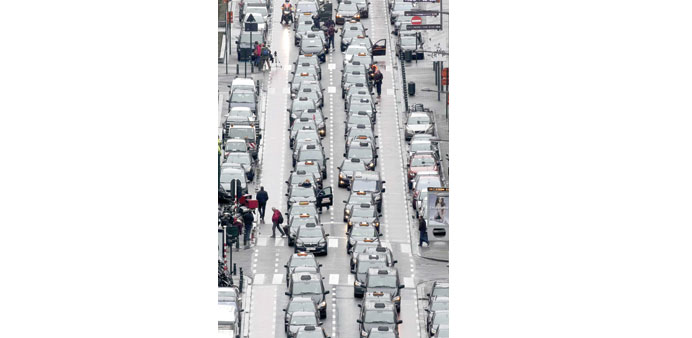DPA/Reuters
Brussels
Up to 1,000 Belgian and French taxis blocked roads around the EU headquarters in Brussels yesterday in protest at competition from the car-sharing service Uber, local media reported.
The US-based company, operating in cities around the world, allows customers to hail cabs via a phone application and uses software to connect them to available cars, keeping costs low.
But the service has drawn opposition from established transport firms.
Police said yesterday that up to 650 taxis had gathered near the EU institutions in the Belgian capital at noon, blocking several of the city’s transport axes, Belga news agency reported.
But organisers put the number at 1,000.
The drivers displayed the words “No to Uber” on their windscreens, Belga reported.
Firecrackers were being thrown near the EU institutions.
The Belgian chauffeurs are protesting at proposed new laws which they argue would deregulate the market in Uber’s favour and cut into the income of regular taxi drivers, according to Philippe Lescot of the CSC-Transcom trade union.
Brussels’ Transport Minister Pascal Smet outlined plans last week for taxi reform in the Belgian capital from the start of 2016, including conditions under which Uber could operate.
French drivers joined the protest, arriving from cities including Paris, Aix en Provence and Lille in the hope of raising their concerns with the European Union, Belga wrote.
But the European Commission, the bloc’s executive, said taxi regulations are primarily a matter of national concern, so long as they comply with overarching EU rules.
“Our Belgian, French, German governments and others are encouraging unfair competition,” said Eddy Maillot, a trade unionist from the southern French region of Var, arguing that licenced taxi drivers face additional costs that are not being taken into account.
Customers of services such as Uber could find themselves unable to claim damages in the case of an accident and may be faced with widely differing tariffs between peak hours and quiet periods, Maillot told Belga.
The company has rejected allegations that passengers are uninsured.
“From the moment you get into an Uber to the moment you’re dropped off, your ride is covered by our commercial insurance. That goes for every trip in every city around the world,” it wrote to customers last week.
Facing legal action in Germany, France and the Netherlands, Uber has promised to create 50,000 jobs this year in European cities that are willing to let them take root.
Smet has said he is aware that Uber and rivals risk creating poorly paid jobs and said Uber would only be allowed to operate according to set criteria – notably keeping a register of all drivers, vehicles and journeys made and paying tax in full.

Taxi drivers line a street in central Brussels during a protest against online ride-sharing company Uber.
